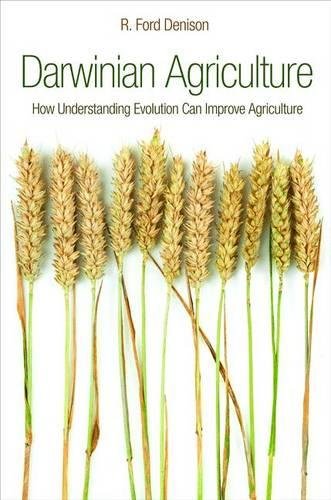R. Ford Denison
R. Ford Denison, the author of Darwinian Agriculture, has given invited and keynote talks throughout the US and in ten other countries. Other scientists cite his publications on evolution and agriculture more than once a day, on average. Much of his research has focused on symbiosis between legumes and the root-nodule bacteria (rhizobia) that supply them with nitrogen. He and his students have also published papers on other topics, including: 1) why natural toxins plants make to defend themselves against insects (perhaps especially on organic farms) can benefit human health; 2) how solar tracking by leaves can decrease whole-crop photosynthesis; 3) why crop yields often decrease, at least temporarily, after switching to organic farming methods; and 4) showing that simple multicellularity can evolve in only two weeks in the lab. He also co-invented devices to assess root-nodule function and to measure sunlight capture by field crops.
Less famous than some other Harvard dropouts, he studied ecology at the Evergreen State College and earned a PhD in Crop Science from Cornell University. After postdoctoral research at UC Davis and UCLA, he did lab and field research with USDA for several years, before returning to UC Davis as a faculty member. There, he taught crop ecology and directed LTRAS, a 72-acre long-term experiment on agricultural sustainability and resource-use efficiency. Meanwhile, his research on nitrogen-fixing crops developed an increasingly evolutionary focus. Soon after promotion to full professor, he took early retirement and moved to Minnesota, where his wife had been a faculty member for many years.
At the University of Minnesota, he is an Adjunct Professor in Ecology & Evolution, mostly mentoring students. He is also a Fellow in the College of Agriculture, advising Minnesota's 3-site long-term agricultural research network.
Popular items by R. Ford Denison
View all offers-
Darwinian Agriculture: How Understanding Evolution Can Improve Agriculture
Denison, R. Ford
Item prices starting from
View 24 offers£ 8.91

